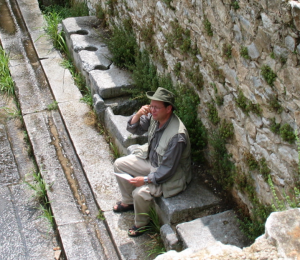We miss a lot when reading the English Bible. We’re at a great disadvantage. The early Christians read the writings of the apostles in the original language — they understood the words and expressions must better than we do.
 For example, Paul writes that he considers all things as refuse that he might gain Christ (Phil 4:8). We lose the impact of his graphic language. Paul wrote in Greek and in Greek the word refuse means human waste or crap. In Paul’s day it might have been the equivalent of the sh** word forbidden in proper communication. Paul used crude language, and it was very graphic for the original readers. Our English translations are very “prope”.
For example, Paul writes that he considers all things as refuse that he might gain Christ (Phil 4:8). We lose the impact of his graphic language. Paul wrote in Greek and in Greek the word refuse means human waste or crap. In Paul’s day it might have been the equivalent of the sh** word forbidden in proper communication. Paul used crude language, and it was very graphic for the original readers. Our English translations are very “prope”.
(Picture: Steve sitting on old stone Roman toilets in Philippi, filming in “Paul, Contending for the Faith”)
Let’s look at another crude example. In Galatians 5:12 Paul reacts to the Jewish converts who tried to make the Gentiles get circumcised. They said the pagans must be circumcised and obey all the 613 laws of Moses to be saved (Acts 15:1). The heretics made Paul so mad that he says he wishes the false teachers would not just cut off the foreskin of the penis but slip and cut the whole thing off. Ouch!
Everywhere else this Greek word is used in the New Testament, it is translated “cut it off” or castration, but most prim and proper English translations render the word as “mutilate themselves” though a few say castrate themselves or “go all the way and emasculate themselves.” Paul didn’t mince his words.
One of my favorite gold nuggets that I discovered in the New Testament is a Greek word used only twice in the whole New Testament. This word relates to God’s two creations. By reading the English Bible you would never know these two different passages use the same Greek word. But you would never know it from reading the English. When you dig deep you find gold!
What are these two creations of God? The first is obviously the physical world created “in the beginning.” The second creation is the Church, into which we are “born again” through baptism, a new creation. Both creations were born out of water with the Spirit of God hovering over the water (Gen 1:2; Mk 1:9-110, John 3:1-5).
Ready? Well here are the two verses; I have italicized the English words that have the Greek word in common:
First, the physical creation: “Ever since the creation of the world his invisible nature, namely, his eternal power and deity, has been clearly perceived in the things that have been made” (Romans 1:20).
Second, the spiritual creation: “For we are his workmanship, created in Christ Jesus for good works, which God prepared beforehand, that we should walk in them” (Ephesians 2:10).
Was I right? Would you have known that the underlying Greek word in both verses is poiema? It is the Greek word from which we get our English word poem. In Romans 1:20, five English words are used to translate one Greek word: poiema which refers to the physical created universe. The word workmanship is what you are, what the Church is. The poem of the Church includes you.
 So, God has “written” two poems: the physical world and the Church. God is a poet, He is an artist, and his two great works of art reveal much about Him as an artist. You can learn a lot from looking at the paintings of an artist or by reading the pages of a poet. Just as any poet can be understood by reading his work, so God can be understood to some degree by reading his poetry.
So, God has “written” two poems: the physical world and the Church. God is a poet, He is an artist, and his two great works of art reveal much about Him as an artist. You can learn a lot from looking at the paintings of an artist or by reading the pages of a poet. Just as any poet can be understood by reading his work, so God can be understood to some degree by reading his poetry.
Go out at night and look at the sky — ponder the masterpiece of God’s creation. Look at the symmetry and beauty of a flower, the power and creatures of the oceans, the majesty of mountains and thunderstorms. Then look at the Church around the world as she redeems sinners. Think of the billions of people that have accepted her embrace and been born into a heavenly family, a culture of love and blessings. Two marvelous, breath-taking creations.
Any you? You are part of God’s two creations, you are written into his poetry and painted on his canvas. He treasures you. You are not a random mass of molecules that happened to appear on lonely planet earth spinning meaninglessly around the sun. No, you are part of God’s glorious poetry that angels admire and God cherishes. Be proud, be thankful. Live worthy of your place in God’s heart.
So, the New Testament is rich in its vocabulary. It is richer than the English language reveals. Like Paul says, anyone that tries to please God by their meager human efforts has nothing but crap to show for it, unworthy of the kingdom of God. Anyone who says we must be circumcised to be a Christian opposes God’s plan of free grace. Paul wanted them to castrate themselves.
Actually the New Testament is rich in imagery and figures of speech. You are blessed to be freely made part of God’s two creations. You are beautiful. The Word of God says so!

-
Save
(Picture: Steve sitting on old stone Roman toilets in Philippi, filming in “Paul, Contending for the Faith”)
Let’s look at another crude example. In Galatians 5:12 Paul reacts to the Jewish converts who tried to make the Gentiles get circumcised. They said the pagans must be circumcised and obey all the 613 laws of Moses to be saved (Acts 15:1). The heretics made Paul so mad that he says he wishes the false teachers would not just cut off the foreskin of the penis but slip and cut the whole thing off. Ouch!
Everywhere else this Greek word is used in the New Testament, it is translated “cut it off” or castration, but most prim and proper English translations render the word as “mutilate themselves” though a few say castrate themselves or “go all the way and emasculate themselves.” Paul didn’t mince his words.
One of my favorite gold nuggets that I discovered in the New Testament is a Greek word used only twice in the whole New Testament. This word relates to God’s two creations. By reading the English Bible you would never know these two different passages use the same Greek word. But you would never know it from reading the English. When you dig deep you find gold!
What are these two creations of God? The first is obviously the physical world created “in the beginning.” The second creation is the Church, into which we are “born again” through baptism, a new creation. Both creations were born out of water with the Spirit of God hovering over the water (Gen 1:2; Mk 1:9-110, John 3:1-5).
Ready? Well here are the two verses; I have italicized the English words that have the Greek word in common:
First, the physical creation: “Ever since the creation of the world his invisible nature, namely, his eternal power and deity, has been clearly perceived in the things that have been made” (Romans 1:20).
Second, the spiritual creation: “For we are his workmanship, created in Christ Jesus for good works, which God prepared beforehand, that we should walk in them” (Ephesians 2:10).
Was I right? Would you have known that the underlying Greek word in both verses is poiema? It is the Greek word from which we get our English word poem. In Romans 1:20, five English words are used to translate one Greek word: poiema which refers to the physical created universe. The word workmanship is what you are, what the Church is. The poem of the Church includes you.

-
Save
Go out at night and look at the sky — ponder the masterpiece of God’s creation. Look at the symmetry and beauty of a flower, the power and creatures of the oceans, the majesty of mountains and thunderstorms. Then look at the Church around the world as she redeems sinners. Think of the billions of people that have accepted her embrace and been born into a heavenly family, a culture of love and blessings. Two marvelous, breath-taking creations.
Any you? You are part of God’s two creations, you are written into his poetry and painted on his canvas. He treasures you. You are not a random mass of molecules that happened to appear on lonely planet earth spinning meaninglessly around the sun. No, you are part of God’s glorious poetry that angels admire and God cherishes. Be proud, be thankful. Live worthy of your place in God’s heart.
So, the New Testament is rich in its vocabulary. It is richer than the English language reveals. Like Paul says, anyone that tries to please God by their meager human efforts has nothing but crap to show for it, unworthy of the kingdom of God. Anyone who says we must be circumcised to be a Christian opposes God’s plan of free grace. Paul wanted them to castrate themselves.
Actually the New Testament is rich in imagery and figures of speech. You are blessed to be freely made part of God’s two creations. You are beautiful. The Word of God says so!


